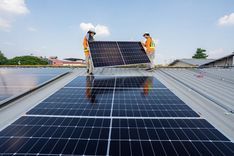For India's micro, small and medium enterprises (MSMEs), particularly in manufacturing, energy costs are a significant operational concern. With electricity tariffs for industrial users being substantially higher than residential rates, adopting solar energy presents a viable solution to reduce expenses and enhance sustainability. However, the decision between leasing and owning solar panels is pivotal, each option offering distinct advantages and considerations.
Understanding solar panel ownership
Ownership entails purchasing and installing a solar system, either through upfront payment or financing options. This approach provides full control over the system and the potential for long-term savings.
Advantages:
Long-term savings - Owners benefit from reduced electricity bills and potential incentives, leading to significant savings over the system's lifespan.
Asset appreciation - The solar installation can increase property value and serves as a tangible asset.
Incentives eligibility - Owners may qualify for government subsidies and tax benefits, enhancing the investment's return.
Considerations:
High initial investment - The upfront cost can be substantial, posing a barrier for some MSMEs.
Maintenance responsibility - Owners are accountable for system upkeep, which may involve additional costs and logistical considerations.
Exploring solar panel leasing
Leasing involves entering into an agreement with a third-party provider who installs and maintains the solar system, with the MSME paying a fixed monthly fee. This model offers a lower barrier to entry but comes with its own set of factors to weigh.
Advantages:
Minimal upfront cost - Leasing requires little to no initial investment, making it accessible for businesses with limited capital.
Maintenance included - The leasing company typically handles all maintenance and repairs, reducing operational burdens.
Predictable expenses - Fixed monthly payments allow for easier budgeting and financial planning.
Considerations:
No ownership benefits - Leased systems do not contribute to asset value or qualify the lessee for certain incentives.
Long-term cost - Over time, leasing may result in higher total expenditures compared to ownership.
Comparative analysis: ownership vs. leasing
| Aspect | Ownership | Leasing |
| Initial Investment | High | Low |
| Maintenance Responsibility | Owner | Provider |
| Incentive Eligibility | Yes | No |
| Long-term Savings | Higher | Moderate |
| Asset Value Addition | Yes | No |
| Contractual Obligations | None | Fixed-term lease |
Making the right choice for your MSME
The decision between leasing and owning solar panels hinges on several factors unique to each MSME, including financial capacity, long-term business goals, and operational preferences.
Consider ownership if:
Your business has the capital to invest upfront or access to favorable financing options.
You aim to maximize long-term savings and asset value.
You are prepared to manage maintenance or can engage reliable service providers.
Consider leasing if:
Your business prefers to avoid significant initial expenditures.
You seek to outsource maintenance responsibilities.
You value predictable monthly expenses over potential long-term savings.
Conclusion: aligning solar solutions with business strategy
For small manufacturers, the transition to solar energy is not merely an environmental decision but a strategic business move. Both leasing and ownership models offer pathways to reduce energy costs and enhance sustainability. By carefully assessing financial resources, operational capabilities, and long-term objectives, MSMEs can select the solar solution that best aligns with their business strategy, ensuring both economic and environmental benefits.




 +91 7208055523
+91 7208055523
 Help & support
Help & support
